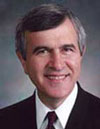 Making ethanol from wood could help prevent forest fires.
Making ethanol from wood could help prevent forest fires.
The Wisconsin State Journal did an interview with Chris Risbrudt, director of the U.S. Forest Products Laboratory in Madison, about that potential. Risbrudt says ethanol is a possible solution to thinning the smaller trees that lead to forest fires.
Q: So U.S. forests need to be thinned?
A: Yes. That’s one reason we spent $1.3 billion fighting forest fires (last) year in the Forest Service; because nature is trying to remove that biomass and get back to the amount it should have. If we thin it to prevent or reduce the impacts of wild fire, it costs us $1,000 per acre because we’re not making many products out of that stuff. We’re trying to figure out how to make products out of that so we can reduce the cost of thinning national forests down to zero.
Q: What products are you working on that would come from that surplus biomass?
A: Ethanol is the big one we’re working on right now. It’s got huge potential. But trees are made up of three major components: lignan, which is the glue, hemicellulose and cellulose. And they’re just sugar molecules strung together.
But (with) the way the tree puts them together, it’s very hard to take it back apart efficiently, so we’re working on that. In fact, the Department of Energy is also working on it, funding projects. They call it the recalcitrant cellulose problem. It just doesn’t want to break down back into sugar very easily.
Q: How close are you to a solution?
A: We’ve patented a strain of yeast called pichia stipitis and licensed it to a company called Xethanol Corp. and they’re building plants right now to make cellulosic ethanol.
Risbrudt says it’s not commerically profitable yet, but they are working on it.
 Two ethanol plants backed by Sir Richard Branson’s Virgin Group have joined the marketing alliance of Pekin, Illinois’ Aventine Renewable Energy Holdings, Inc.
Two ethanol plants backed by Sir Richard Branson’s Virgin Group have joined the marketing alliance of Pekin, Illinois’ Aventine Renewable Energy Holdings, Inc. Aventine will market all of the ethanol produced by Indiana Bio-Energy of Bluffton, Indiana and Ethanol Grain Processors, LLC of Obion, Tennessee when the facilities are completed next year. Both are 100 million gallon per year nameplate facilities.
Aventine will market all of the ethanol produced by Indiana Bio-Energy of Bluffton, Indiana and Ethanol Grain Processors, LLC of Obion, Tennessee when the facilities are completed next year. Both are 100 million gallon per year nameplate facilities. 

 The National Ethanol Conference is underway in Tucson, AZ. Today is golf tournament day and RFA President and CEO, Bob Dinneen, welcomed everyone before they headed out on the course.
The National Ethanol Conference is underway in Tucson, AZ. Today is golf tournament day and RFA President and CEO, Bob Dinneen, welcomed everyone before they headed out on the course.
 In this edition of “Fill Up, Feel Good” we explore an explorer’s efforts to educate people about global climate change and how ethanol is helping.
In this edition of “Fill Up, Feel Good” we explore an explorer’s efforts to educate people about global climate change and how ethanol is helping. Making ethanol from wood could help prevent forest fires.
Making ethanol from wood could help prevent forest fires. You can’t enjoy paradise when the skies are filled with smog… that seems to be the idea behind a $61 million biodiesel plant planned in the Hawaiian Islands. The Blue Earth Maui Biodiesel LLC refinery would provide
You can’t enjoy paradise when the skies are filled with smog… that seems to be the idea behind a $61 million biodiesel plant planned in the Hawaiian Islands. The Blue Earth Maui Biodiesel LLC refinery would provide  When cellulosic ethanol will become commercially viable is a big question that has many answers.
When cellulosic ethanol will become commercially viable is a big question that has many answers. The question will be a topic at the
The question will be a topic at the  The
The  Tom Branhan of
Tom Branhan of